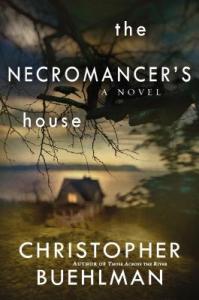Who among you recommended Those across the River to me? Anyone a fan of that book? I checked it out months ago, couldn’t get into it, and returned it unread to the library with a mental asterisk to return to it someday. I haven’t yet, but I did read The Necromancer’s House (affiliate links: Amazon, B&N, Book Depository), the newest book by that same author, and I thought it was great. This is lucky because historically when I’ve read a different book than the recommended one by the recommending person, it hasn’t turned out well for me.
The beginning: A man called Andrew owns a house, a cobbled-together magically animated manservant that used to be a dog, and a horde of stolen Russian magic. One day a water sprite with whom Andrew is loosely affiliated murders a man who turns out to be the son of Baba Yaga, and all hell is unleashed upon Andrew and his world.
The end (spoilers in this section only, so skip down to “the whole” if you don’t want to know): Andrew appears to be occupying the body of his opponent, and it seems to be permanent. One assumes from this that he won the battle, but that it was a Pyrrhic victory. A character I haven’t met yet has died in the battle, as have a few characters I did meet, and Andrew decides sadly to turn his cobbled-together magical manservant back into a dog and let it die. So that is sad. Not quite as sad as just a regular dog regular dying, but still pretty sad.
The whole: This book had such cool magic. I haven’t encountered such an interesting, weird, varied magical world in I don’t know how long. Whenever Andrew or any of his magical friends did a spell, the ingredients and effects of it surprised and pleased me. Buehlman uses tropes you’ve seen a hundred times before, but twists them in weird wonderful ways, so that the magicians appear to be both insanely gifted and also, I don’t know, rather practical and ad-hoc? Does that make sense as a descriptor? I mean that they usually act with deliberation, but there is an extent to which they are also throwing everything they can think of at the wall to see what sticks.
Not only was the magic cool, but the magical community was really interesting: As just one example, Andrew is able to take VHS tapes with recordings of dead people and open “trap doors” in them, which allows you to have real conversations with the people recorded on the videotapes. He does this for money sometimes, or in exchange for spells from magicians with different specialties to his. (For once, Jeanne, necromancy pays. Actual dollars.)
The magic was so consistently cool and creepy that I was able to overlook some aspects of the book that would ordinarily have bugged me. The writing gets very herky-jerky whenever any action is happening. Viz.:
The following year, Salvador chases a doe into the road.
The big Swede in the pickup truck misses the doe.
Not the dog.
Andrew drinks for two more years.
Thinks that’s when he calls Ichabod.
Thinks that’s when he botches the spell to send him back.
Thinks it’s time to stop drinking.
When really it’s long past time.
This sort of writing is okay sometimes. In fact, sometimes I really like it (see also, Patrick Ness). But as the book kept on going, I did not always agree with Buehlman that the action merited such an extremely high predicate to subject ratio. I sometimes wished he would write regular, and save the predicate extravaganzas for climactic action sequences.
As I said, though, the magic is just so cool. And most of the book is about the magic. It’s not clear to me why the Russian witch has such unstoppably vicious magic — I suppose just because she is Baba Yaga, and Baba Yaga knows these things? — but I loved the inadvertent nature of the precipitating event. Just that someone Andrew knew, someone who is a water sprite and kills people in that vicious water-creature-way of mythology, killed a man she shouldn’t have, and it all came back on Andrew. For Andrew, a very small thing that he might have somehow prevented, and he didn’t, and the result was that someone came in to tear his world apart.
(Magically.)
(Seriously, the magic was so m.f. cool.)
If Those across the River has any of these same practical-minded spookiness, I think I will be very much into reading it. It may be a better book for reading in hard copy, and not on my Nook. The Necromancer’s House was better as a hard copy. Have you found some books are like this?

Cover report: The British and American covers are the same. It’s fine, as far as it goes — that is just what you would imagine Andrew’s house looking like — but it doesn’t capture anything of the way Andrew’s magic feels. Oh well. Can’t have everything.